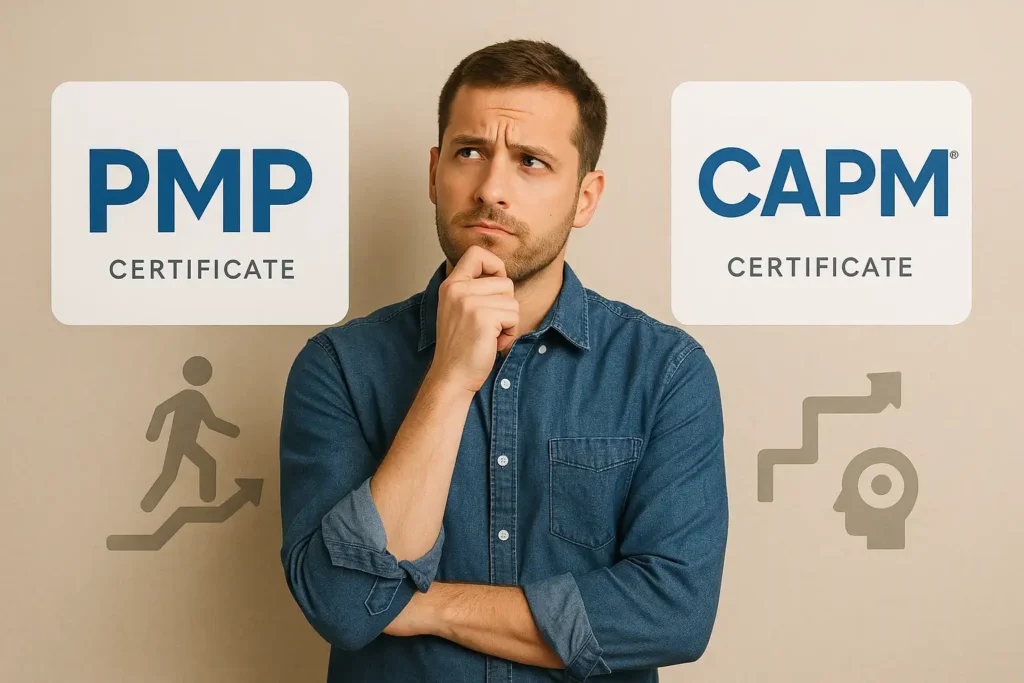PMP® Certification vs CAPM®: Which Offers Better Value for the Investment?
By: Ryan Malaluan, CAPM®; Editor: Geram Lompon; Reviewed by: Alvin Villanueva, PMP®, PMI-ACP®
If you’re looking to advance in
In this article, we’ll compare CAPM® and PMP® certifications, focusing on their exam content, requirements, and how each can impact your professional development. The PMP® is seen as the top choice for
This CAPM® vs guide will help you understand which certification is best for your current career stage and future ambitions.
Key Takeaways
- Understand the differences between PMP and CAPM certifications.
- Discover which certification is best suited to your career goals.
- Discover the industry-wide benefits of each certification.
- Find out which certification is considered more prestigious.
- Explore the eligibility criteria for both certifications.
Understanding PMP and CAPM Certifications
If you’re aiming to grow your
They require familiarity with the
What is the Project Management Professional (PMP) Certification?
The PMP certification is ideal for experienced professionals who’ve led and directed projects. It’s one of the most recognized credentials in
It emphasizes leadership, strategic execution, and advanced
What is the Certified Associate in Project Management (CAPM)?
The CAPM certification is an entry-level credential designed for project managers who are new to the field and starting their careers. CAPM focuses on foundational
Many CAPM holders often work as assistant project managers, helping coordinate schedules and facilitate communication within project teams. It’s a great way to demonstrate your knowledge of the basics.
The Project Management Institute (PMI) and Its Certification Framework
The PMI is a big name in
Both the PMP and CAPM fit into this framework, helping you advance in your career. The CAPM can also serve as a supplemental certification for professionals seeking to expand their
Comparing Requirements and Eligibility
To choose between the PMP and CAPM, it’s essential to understand the differences in eligibility requirements. Both certifications are offered by the
The PMP certification requires more extensive qualifications, including formal education and a specified number of
PMP Certification Requirements
The PMP certification is designed for experienced project managers who seek to validate their ability to manage complex projects. It has strict eligibility criteria that include specific education levels and extensive
Candidates must demonstrate leadership, applied knowledge, and time spent leading and directing projects. Meeting the PMP certification requirements helps professionals gain industry recognition and qualify for advanced roles within their field. This credential also supports long-term professional development and access to senior-level positions in
Education and Professional Experience Prerequisites (PMP Certification Requirements)
To qualify for the PMP exam, you need a secondary degree (like a high school diploma or associate’s degree) plus 7,500 hours of
35 Hours of Project Management Training
In addition to experience, PMP candidates must complete 35 hours of
These hours can be fulfilled through either a formal course or an asynchronous course, both of which cover essential
CAPM Certification Requirements
The CAPM certification is designed for newcomers to the field of
This certification is widely recognized as an entry-level certification and serves as a stepping stone toward the PMP certification. CAPM helps build a foundation for a future
Educational Background
To apply for the CAPM exam, you must have either a high school diploma or an associate’s degree. This education requirement makes CAPM more accessible than PMP, which requires extensive work experience.
CAPM is often chosen by students, recent graduates, or professionals looking to transition into
23 Hours of Project Management Education
Applicants must complete 23 hours of
Training can be completed through self-paced modules, virtual classrooms, or instructor-led programs. This requirement introduces candidates to key topics from the
Time Investment and Maintenance
While PMP holders must earn 60 PDUs every three-year cycle, CAPM credential holders are required to earn 15 PDUs during the same time frame. These professional development units (PDUs) can be gained through
This maintenance requirement ensures that CAPM-certified individuals continue learning and stay current with industry trends. Maintaining the certification also supports long-term career development and signals commitment to professional growth in the
PMP Certification vs CAPM: Cost and Exam Comparison
When deciding between PMP certification vs CAPM, exam costs and structure are significant considerations. Both certifications require passing rigorous certification exams and investing in preparation resources. Your PMI membership status, choice of training method, and support from your organization—such as human resources reimbursement—can all impact the total costs.
Understanding the financial and time commitments involved will help you select the most suitable certification for your career goals in
PMP Certification Costs
Your PMI membership status directly impacts the cost of the PMP exam. Additionally, preparation materials and training can increase the total investment:
- PMI members: $405
- Non-members: $555
- Study materials: $200–$1,000
These materials may include practice exams, textbooks, and video courses. Reviewing the PMP handbook is essential for understanding the exam outline and structure. Though the investment is higher, PMP offers long-term value for project managers looking to lead complex projects and earn a higher salary.
CAPM Certification Costs
The CAPM exam is more budget-friendly and ideal for those entering the
- PMI members: $225
- Non-members: $300
- Prep resources: $100–$500
Training options range from self-paced online modules to instructor-led sessions. Many CAPM holders take advantage of company-sponsored programs, where human resources departments help cover the costs of the exam. This makes CAPM a solid, cost-effective credential for entry-level project managers starting their
Exam Format and Difficulty
While both certifications feature multiple-choice questions, they differ in complexity, scope, and time:
- PMP exam: 180 questions, 230 minutes, includes agile methodologies
- CAPM exam : 150 questions, 180 minutes, focuses on project management fundamentals
The PMP certification exam is more demanding, testing your ability to lead complex projects and apply real-world knowledge. In contrast, the CAPM exam emphasizes theoretical understanding. Success in either exam requires dedicated study, but PMP demands a deeper level of
Career Impact and Return on Investment
Earning either the PMP or CAPM certification can significantly impact your career path in
Choosing the proper certification based on your experience level will ensure a strong return on investment, whether you’re aiming to enter the field, move into leadership roles, or manage complex projects in high-impact environments.
PMP Career Benefits
- PMP professionals can earn a higher salary (up to 33% more). Studies consistently show that PMP-certified professionals earn more than their non-certified peers, reflecting the high value of the credential in the job market.
- Open to PMP-certified professionals: senior roles, larger projects, complex projects. PMP certification prepares you to lead complex projects and take on roles that involve managing larger teams and budgets across industries.
- Recognized across industries as a top-tier certification. Employers view PMP credentials as a mark of leadership, strategy, and deep
project management knowledge, making it one of the most sought-after certifications in the field.
CAPM Career Benefits
- Prepares candidates for entry-level project managers or assistant project manager roles. CAPM certification signifies readiness for project roles and enables professionals to start their careers as coordinators, schedulers, or associate project managers.
- Boosts qualifications as a certified associate. As a certified associate in
project management , you’ll stand out from other candidates by proving your grasp ofproject management fundamentals. - Serves as a stepping stone to PMP. Earning the CAPM first allows you to build experience and later meet the PMP certification requirements, making it a practical path for long-term career advancement.
Industry Recognition and Global Value Comparison
Both PMP and CAPM certifications are widely respected and hold strong global credibility. However, the PMP certification is often viewed as more prestigious by hiring managers and recruiters, especially for leadership and executive-level roles.
These credentials show that you understand professional standards and bring a structured methodology to your work. Whether you’re working locally or abroad, both certifications support career growth and long-term success in
- Both are considered global equivalents and recognized internationally as professional benchmarks in
project management . - Valuable in international markets and for project compliance roles. Ideal for companies that prioritize project governance, standards, and cross-border operations.
Which Certification Matches Your Career Stage
Your current experience and future ambitions should guide your certification decision. While both are issued by the
- CAPM: great for those starting or coordinating smaller teams. Perfect for aspiring entry-level project managers and early-career professionals.
- PMP: ideal for professionals leading projects, handling strategy, and managing complexity. Tailored for individuals with experience leading projects and handling large-scale initiatives.
Strategic Certification Path: From CAPM to PMP
Many professionals begin their journey with the CAPM certification, then advance to PMP as they accumulate more
Becoming an active CAPM credential holder can even help fulfill part of the PMP certification requirements, making this path not only strategic but also efficient. This staged approach ensures a strong foundation and long-term growth in
Complementary Certifications and Specializations
Beyond CAPM and PMP, PMI offers several specialized certifications to further your expertise. These credentials enable you to tailor your skill set for niche or emerging areas of
Whether your focus is on adaptability, control, or innovation, these certifications demonstrate a commitment to continuous learning and professional development.
- Explore specialties like agile methodologies, risk management, and hybrid models. Certifications like PMI-ACP (Agile) and PMI-RMP (Risk) enhance your toolkit. Additionally, disciplined Agile can also be beneficial.
- These enhance your
project management skills and credentials. They make you more versatile and competitive in today’s dynamic job market.

Wrapping Up: Choosing the Right Path Forward
When weighing the PMP certification vs CAPM, it’s essential to consider your current experience, career goals, and long-term growth potential. If you’re beginning your journey in
For experienced professionals with a history of leading projects, PMP certification provides the credibility and recognition to take on more complex responsibilities.
Both certifications offer distinct advantages and serve as valuable stepping stones in your
References
Brain Sensei. (n.d.). PMP Exam Outline: PMP Essentials. https://brainsensei.com/exam-outline-pmp-essentials/
Forbes Advisor. (2023, June 21). CAPM Certification Cost: What You Need to Know. Forbes. https://www.forbes.com/advisor/education/certifications/capm-certification-cost/
Forbes Advisor. (2023, May 30). PMP Certification Cost: What You Need to Know. Forbes. https://www.forbes.com/advisor/education/certifications/pmp-certification-cost/
IMT-PM. (2024). CAPM Exam in 2025: Everything You Need to Know. International Management Training. https://www.imt-pm.com/capm-exam-in-2025-everything-you-need-to-know/
Project Management Institute. (2021, December 9). PMP vs CAPM: Which
The Knowledge Academy. (n.d.). PMP Certification Requirements. https://www.theknowledgeacademy.com/blog/pmp-certification-requirements/

